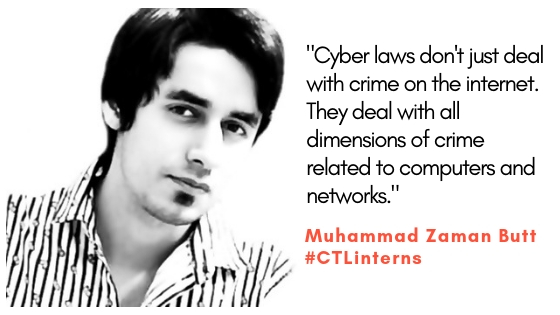A Brief Round Up of Cyber Crime Law In Pakistan
Cyber crime is a crime in which criminal activities are carried out by means of computers or the internet. Cyber crime has been talked about a lot ever since the law was passed by Parliament on September 21, 2016.
In Ch. Muhammad Ashfaq v. The State and others 2015, the defendants offered lucrative jobs to the residents of the country and in the process acquired registration fee for such jobs. Both the accused and the co-accused collected an amount of more than 5 million but neither did they offer any job nor provide any monetary refund to the people who registered with them. They had committed fraud. The Supreme Court refused bail as well as the right to appeal.
When more and more crimes like blackmailing on the internet, phishing, online defamation, child pornography, and the spread of false information started appearing, the need for cyber laws became more urgent. Pakistan Today reported that FIA’s Cyber Crime Wing registered 894 cases since January 2013 and decided 179 cases by 2017. With the passage of time, there were even newer challenges in trying to control cyber crime in Pakistan. Such crimes also entail corresponding punishments, a few of which are mentioned below:
- Spreading false information about an individual: up to 3 years in prison or up to PKR 1 million in fine, or both – if someone intentionally and publicly displays any information through any information system, which he or she knows to be false and by which he or she intimidates or harms the reputation or privacy of a natural person.
- Child pornography: up to 7 years in prison or up to PKR 5 million in fine, or both – if a minor is shown to be engaged in sexually explicit conduct, or a person appearing to be a minor is engaged in sexually explicit conduct, or there are realistic images representing a minor engaged in sexually explicit conduct.
- Making videos/taking photographs and distributing them without consent: up to 3 years in prison or up to PKR 1 million in fine, or both – if someone takes a photograph or makes a video of any person and displays or distributes it without his or her consent and in a manner that harms that person.
The law on cyber crime is a relatively new one in the Pakistani legal system and most of it has been derived from laws being practiced in other countries. Since cyber crime is different from street crime, the laws and policies drafted by law enforcement agencies, precautions taken by citizens, especially young girls and boys (such as not disclosing passwords, emails or barcodes with personal information, or opening suspicious links, etc.), and educational and awareness campaigns on cyber crime must also be synchronized and updated accordingly to combat the causes of this curse. It is surprising to note that many cyber crimes remain unresolved due to a lack of cyber forensics and the unavailability of forensic labs and experts.
With the existence of a cyber crime law, the ratio of cyber crime may well be on its way to decrease, however, the legislation needs to be frequently upgraded given the technological advancements in our society as well as the best practices and rules evolving internationally.
The views expressed in this article are those of the author and do not necessarily represent the views of CourtingTheLaw.com or any other organization with which he might be associated.


